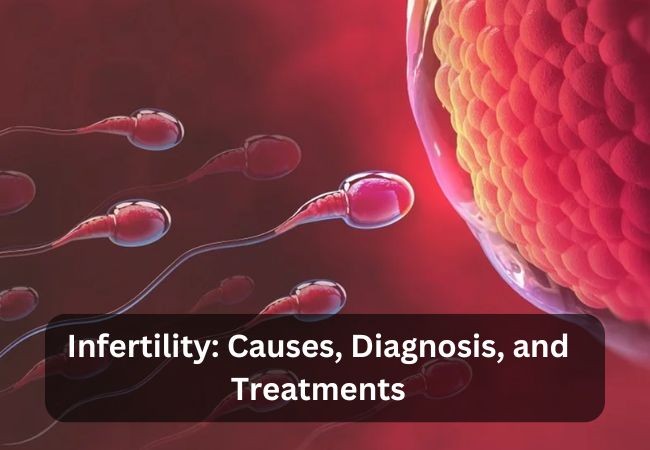Infertility means you cannot get pregnant after trying for a year. It can be caused by problems like endometriosis, irregular ovulation, low sperm count, or low testosterone. The risk of infertility goes up with age. You can get infertility treatment as there are many available for people facing infertility.
Infertility is a condition that makes it hard for people to get pregnant. It can happen to anyone and has many causes. Getting pregnant involves various steps which are as follows.
Pregnancy will not happen if any part of this process does not work.
If you are under 35, a doctor may diagnose infertility after trying to get pregnant for one year with regular, unprotected sex. If you are 35 or older, infertility may be diagnosed after six months of trying. Infertility is very common. Luckily, infertility treatment is available a lot for people who want to start or grow their family.
Some causes of infertility affect only one partner, but others affect both. Risk factors for infertility are as follows:
Firstly, your doctor will ask about your full medical and sexual history. For people with a uterus, fertility involves releasing healthy eggs. Your brain sends hormones to your ovary to release an egg which then travels from the ovary through the fallopian tube to the uterine lining. Fertility testing checks for issues in any of these steps. These tests will also help find or rule out problems:
Diagnosing infertility in men usually involves checking if they produce healthy sperm. Most fertility tests look for issues with sperm. These tests will help find or rule out problems:
Infertility treatment for women are as follows:
Infertility treatment for men are as follows:
Some couples may need extra help to conceive which can involve using assisted reproductive technology (ART). ART includes any fertility treatment where a healthcare provider helps with the sperm or egg. To improve the chances of getting pregnant, you can take medications to stimulate ovulation before trying one of these options:
Preventing infertility involves living a healthy lifestyle. This includes maintaining a healthy weight, avoiding alcohol and smoking, and managing stress. Limiting caffeine intake is also important. Both men and women should focus on living healthily for a better chance of getting pregnant.
But if you want any infertility treatment in Kochi, you can approach EMC Hospital. Our team is made up of specialists like reproductive endocrinologists, embryology experts, nurses, and lab professionals. We focus on helping individuals and couples with fertility challenges. We also do counseling sessions for sexual problems and stress relief during infertility treatment for both partners. As the best hospital in Kochi, we are proud to have helped many couples get the right infertility treatment in Kochi.


Discover the truth behind common plastic surgery myths. Learn what's real, what's outdated, and how modern procedures truly work.

A step-by-step overview of GI surgery, covering what to do before surgery, what happens in the OR, and how to ensure a strong recovery.

Learn about cancer, its early signs, and prevention tips to lower your risk. Early detection saves lives—stay informed, take proactive steps, and protect your health.

Discover why a skilled pediatrician is essential for your child's growth, development, and overall well-being, from infancy through adolescence.

Discover how dermatology can help tackle acne, slow aging, and treat various skin conditions for healthier, more radiant skin.

Discover common childhood allergies, their symptoms, and management tips. Stay informed to keep your child safe and healthy.

Your liver plays a vital role in metabolism, digestion, immunity, and detoxification. Learn how liver health affects your body and ways to maintain its function.

Strong bones support your body and protect your health. Discover simple diet, exercise, and lifestyle tips to maintain bone strength at any age.

Discover the symptoms, causes, and treatment of hypertensive heart disease. Learn how high blood pressure affects your heart and when to seek medical care.

Learn about chest pain symptoms, causes, and treatments. Know when to seek medical help for a healthier heart.